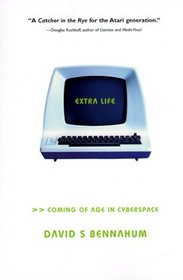I didn't know what to expect when I started this book; especially with the opening chapters about France, I almost didn't become fully immersed. But I stuck in, and was tremendously rewarded for my patience. Even though I am ten years younger than the author, most of the same experiences reminded me of why I was a computer nerd through middle and high school and why the computing world used to be a much more interesting space, at least for the geeks rather than the consumers.
This is the story of David's computing life up until the mid to late 90's. From discovering electronic gizmos in his father's office (what would have been $1000 then would sell in a dollar store now) to interviewing with Microsoft just before they reclaimed their dominance in their industry a few years later.
You can see how one generation is connected to the next. Page 67, as the author lays out the "commandants" followed subconsciously by his fellow peers, echo loudly those in Steven Levy's essential book, "Hackers: Heroes of the Computer Revolution", followed by the PDP hackers of the 60's.
If the book has any flaws, it is that a lot of side stories didn't feel wrapped up to me; the author would mention things going on with his sister, for example, from time to time in the book, and then would leave the subject alone for a half-dozen chapters. Some of the information written about the secondary players in the Epilogue, and how their time was spent between high school and the book writing, might have been better placed within the chapters.
It is a shame, however, that this book wasn't written ten years later, as it would be very likely that the author would have been able to find and reconnect with all the players in the story, thanks to social networking. I imagine he has tried to find Misha since writing the book?
This is the story of David's computing life up until the mid to late 90's. From discovering electronic gizmos in his father's office (what would have been $1000 then would sell in a dollar store now) to interviewing with Microsoft just before they reclaimed their dominance in their industry a few years later.
You can see how one generation is connected to the next. Page 67, as the author lays out the "commandants" followed subconsciously by his fellow peers, echo loudly those in Steven Levy's essential book, "Hackers: Heroes of the Computer Revolution", followed by the PDP hackers of the 60's.
If the book has any flaws, it is that a lot of side stories didn't feel wrapped up to me; the author would mention things going on with his sister, for example, from time to time in the book, and then would leave the subject alone for a half-dozen chapters. Some of the information written about the secondary players in the Epilogue, and how their time was spent between high school and the book writing, might have been better placed within the chapters.
It is a shame, however, that this book wasn't written ten years later, as it would be very likely that the author would have been able to find and reconnect with all the players in the story, thanks to social networking. I imagine he has tried to find Misha since writing the book?
An interesting and, at the very least, amusing read. It covers a number of old memories (growing up with Pong, etc) I easily related to as a geek at heart..




